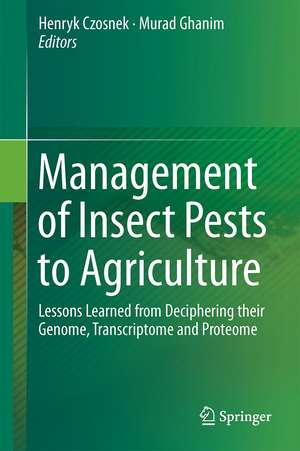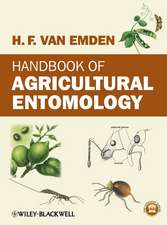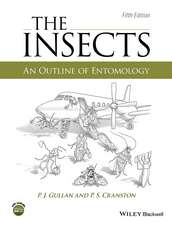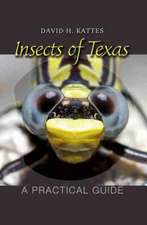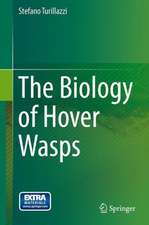Management of Insect Pests to Agriculture: Lessons Learned from Deciphering their Genome, Transcriptome and Proteome
Editat de Henryk Czosnek, Murad Ghanimen Limba Engleză Hardback – 18 ian 2016
| Toate formatele și edițiile | Preț | Express |
|---|---|---|
| Paperback (1) | 640.55 lei 6-8 săpt. | |
| Springer International Publishing – 30 mar 2018 | 640.55 lei 6-8 săpt. | |
| Hardback (1) | 646.75 lei 6-8 săpt. | |
| Springer International Publishing – 18 ian 2016 | 646.75 lei 6-8 săpt. |
Preț: 646.75 lei
Preț vechi: 760.88 lei
-15% Nou
Puncte Express: 970
Preț estimativ în valută:
123.77€ • 128.48$ • 103.20£
123.77€ • 128.48$ • 103.20£
Carte tipărită la comandă
Livrare economică 22 martie-05 aprilie
Preluare comenzi: 021 569.72.76
Specificații
ISBN-13: 9783319240473
ISBN-10: 3319240471
Pagini: 290
Ilustrații: VIII, 290 p. 26 illus., 15 illus. in color.
Dimensiuni: 155 x 235 x 18 mm
Greutate: 0.59 kg
Ediția:1st ed. 2016
Editura: Springer International Publishing
Colecția Springer
Locul publicării:Cham, Switzerland
ISBN-10: 3319240471
Pagini: 290
Ilustrații: VIII, 290 p. 26 illus., 15 illus. in color.
Dimensiuni: 155 x 235 x 18 mm
Greutate: 0.59 kg
Ediția:1st ed. 2016
Editura: Springer International Publishing
Colecția Springer
Locul publicării:Cham, Switzerland
Cuprins
1. Plant-herbivore interactions in the era of big data.- 2. Proteomic insights into the hidden world of phloem sap feeding.- 3. Genomics of phenotypic plasticity in aphids.- 4. Hormonal regulation of development and reproduction.- 5. Revelations on the regulatory mechanisms in moth sex-pheromone signals.- 6. Interactions between insect vectors and propagative plant viruses.- 7. Interactions between the whitefly Bemisia tabaci and begomoviruses: biological and genomic perspectives.- 8. Functional genomics in the whitefly Bemisia tabaci species complex.- 9. Plant immunity: connecting the dots between microbial and Hemipteran immune responses.- 10. Silencing of aphid genes by dsRNA feeding from plants.- 11. Management of rice planthoppers through recent advanced research
Textul de pe ultima copertă
Insects causee tremendous dammages to agricultural crops due to their feeding habits and because they transmit many viruses. While studies on some organisms have advanced into the post-genomics era, research on most agriculturally important plants and herbivores is just beginning to enter the phase of discovery. The application of new technologies such as whole-genome sequencing, analysis of transcriptome and proteome to major insect pest to agriculture has allowed great progress in understanding the life style, reproduction, evolution and nuisance to crops caused by insect pests such as aphids, planthoppers, and whiteflies. We believe that time has come to summarize progress and to have a glance over the horizon. In this Book experts in the field present their recent discoveries and discuss novel means to increase the different kinds of resistances of plants to efficiently limit the effects of pest, to understand and disturb the hormonal regulation of embryogenesis, molting, metamorphosis and reproduction, to determine the function of insect genes in diverse processes such as metabolism, interaction with plants, virus transmission, development, and adaptation to a changing environment. The knowledge presented here is discussed with the aim of further improving control strategies of insect pests and enhance resistances of crop plants.
Caracteristici
Summarizes todays knowledge in the field of insect pests to agricultural crops Management of insect pests to agriculture Summarizes the current knowledge
